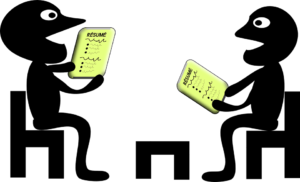It’s Not Just What They Ask, its what they mean that counts – Interviews The Hidden Agenda
What do you think you’re going to an interview for? To list your qualifications and discuss what’s on your resume? That’s just the tip of the iceberg, and you’re the Titanic if you don’t go in with at least an idea of what is behind their questions.
Sure, there are the standard questions, because the basic information has to be conveyed some way, and besides reading your resume, they like to see you sweat and whether you can be caught out with any inconsistencies between what is on paper, and what comes out of your mouth. But interviews can be full of potholes that you won’t even see coming, because you’ve been lulled into a false sense of bonhomie by the pleasant manner of the recruiter. Before you know it, and sometimes even without knowing it, you’re spilling all your little job secrets, your insecurities, and clues as to your character or work ethics.
Interviews: The Hidden Agenda
Preparation as always, is the key. Having talent and being committed to your employer won’t cut any mustard, if the interviewer snags a juicy bit out of something you just said, and tosses it back at you, only to be greeted with a blank stare and stuttering.
It’s not what you want out of the job, it’s what you can bring to the job.
Face it, you can be the most qualified (technically) candidate on the planet, but you’re not going to get the position on that alone. Do your homework and find out what the company wants in the person who does get the job. What do they expect in the way of job performance? How do they view initiative? Then when you’re interviewed, give them a potential employee who has all that and the technical skills. Because a successful interview is not always about what you can tell them, but about what they want to hear (the Hidden Agenda).
Employers want people who are not only going to keep the company running, but who are going to take it to new levels of success.
You can tell an interviewer what you’re capable of, but how are you going to sell them on your aptitude and attitude? Show them, that’s how!
Don’t just say "I work well with others", tell them how you involved different departments in a cooperative effort to cut waste within the office, and how your past employer benefited from it, as well as how the company "team" enjoyed their joint efforts.
See my Perfect Interview Answers
Never mind boasting that you have a nose for new things. Give them a rundown (not a brag list) of new procedures that you initiated, which resulted in more efficient operations at your last job. Or tell them about the ideas you presented, which were incorporated into the company marketing plan, resulting in increased profits for the last year.
As I said before interviews are not just fact-finding missions – remember the Hidden Agenda. Recruiters and company interviewers are looking beyond the person in front of them, to find the right one for the job. And the applicant who gives them a potential employee with experience and qualities to the company’s benefit, is the one who’s going to get that job.
Interviews: Dealing With The Hidden Agenda
1. Investigate the company’s culture, markets, and finances. But resist the temptation to show off what you’ve researched: “I just read that you’re about to embark on a new product line”) unless you have a question directly related to your career.
2. Look like you belong. Learn the company’s dress code and err on the side of conservatism. When you’re seeking a senior position based on industry experience, you’ll be expected to know the rules without being told.
3. Take charge of the interview and use your powers of persuasion The most successful interviews feel like friendly conversations. When your interviewer has a Hidden Agenda (such as the infamous “stress interview”) stay relaxed. Think of playing a game.
4. Assume everyone you meet will provide feedback to the decision-maker. Some companies hand out comment forms to receptionists, security guards and potential peers who take you to lunch.
5. Communicate interest and enthusiasm, even if you’re not sure you’re ready to commit. You’ll rarely have all the facts until you’re looking at an offer.
6. Bring extra copies of your correspondence from this company as well as your resume, references, writing samples, portfolio and current business cards. Interviewers lose documents and conversations move in unexpected directions.
7. Create a relaxed, positive attitude by devising a realistic game plan. When your career isn’t riding on a single interview, you’ll have fun and make a confident, relaxed impression.
8. Write a thank you letter within forty-eight hours. Create a low-key sales letter, emphasizing how your qualifications match the company’s needs. Present yourself as a resource, not a supplicant.
9. After you write the letter, forget about the interview. Email or phone only if you’ve received a competing offer with a deadline.
Occasionally you may make points with follow-up mailings. A sports team public relations applicant sent puzzles, games and press releases — and she got the job. Use your intuition.
10. Keep notes of what you learned from the process. What worked? What would you do differently?
As soon as you begin your new job, remember the Hidden Agenda and develop a career plan and a safety net before you need one.

